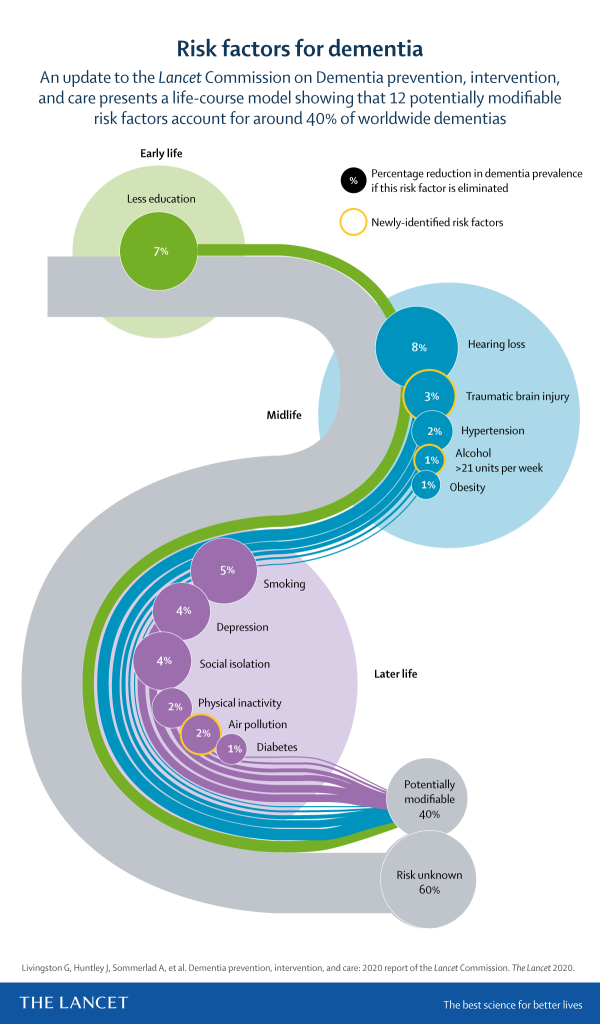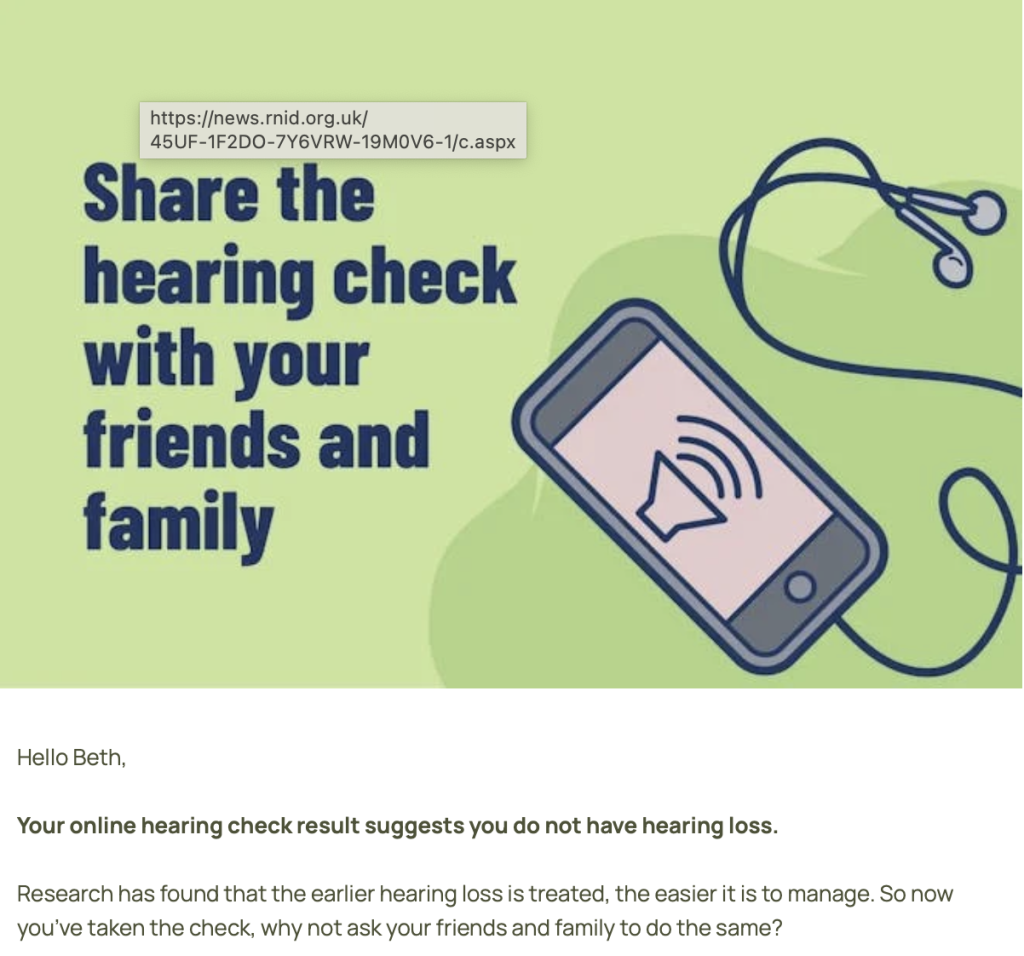 If you didn’t know that, you’re not alone. I first learnt about it when the Lancet published their risk factors infographic in 2017, that was then updated to this version in 2020.
If you didn’t know that, you’re not alone. I first learnt about it when the Lancet published their risk factors infographic in 2017, that was then updated to this version in 2020.
Hearing loss had already been on my radar prior to 2017 though, after I wrote this blog in 2016 about my mum’s experiences of wearing hearing aids.
Hearing loss didn’t feature in my dad’s life at all, so it’s certainly not the case that it affects every person with dementia, but it’s a big, big issue for many reasons and it’s great to see it being highlighted in the media.
Hearing loss as a risk factor for developing dementia
The first reason I’m such an advocate of understanding the link between hearing loss and dementia is, of course, that 8% risk factor the Lancet highlighted. The RNID are recommending everyone has a hearing check every two years (like we would our eyesight). They have a simple online test that you can complete which only takes a few minutes and is achievable for most people.
I did the RNID check myself after hearing about it on the radio. It was in some ways a scary experience, after all you don’t know what the outcome might be, but it was also very easy to do and I’d really recommend giving it a go. Fortunately I don’t currently have hearing loss, but if the test detects a person might have hearing loss it will recommended that the individual sees an audiologist for more extensive investigations.
The RNID are suggesting that everyone in their 40’s and 50’s is offered regular hearing checks on the NHS. This seems a sensible idea in light of how correcting hearing loss can lower your risk of developing dementia, as well as enhancing your overall enjoyment of your life and ability to socialise, understand what is going on around you and reduce your chances of being lonely and isolated.
Hearing loss as a barrier during the dementia diagnostic process
In my work with the Memory Services National Accreditation Programme (MSNAP) we look at how Memory Services support people who have hearing loss during and after the diagnostic process.
Clearly it is absolutely vital that clinicians understand if someone has hearing loss and how this will impact their ability to participate in assessments and tests, especially if that hearing loss is undetected or uncorrected. In the immediate aftermath of a diagnosis, uncorrected hearing loss would also make it much more difficult to participate as meaningfully as possible in any post-diagnostic support that is provided, such as cognitive stimulation therapy (CST).
Hearing loss as a barrier to quality of life with dementia
Hearing loss is something that makes people very isolated, and of course since dementia makes many people who live with it isolated as well this becomes a double whammy. It can often be very difficult for a person with dementia to wear hearing aids as their dementia progresses. They may not understand what they are for (if they weren’t wearing them in their earlier life, it may seem alien to wear them now), or they may not find them comfortable or easy to maintain.
The end result of uncorrected hearing loss might be those communicating with the person resorting to shouting at them, or the person with hearing loss may be ignored altogether. Without the cognitive skills to explain how they are feeling or question what is being said that pattern of isolation will only become more embedded.
It’s also worth pointing out that hearing loss isn’t the only hearing-related issue that a person with dementia can have. Wendy Mitchell has written about her hyperacusis, which is a condition that means loud noises are amplified, causing pain. You can read more about Wendy’s experiences in her blog. There would, of course, be other causes of hearing problems too, so having regular hearing checks is recommended.
Supporting a person with hearing loss
Knowing how to support a person with hearing loss who is also living with dementia in vital, and in my work I signpost to two amazing resources created by Agnes Houston, a lady living with dementia and sensory challenges. These resources enable us all to learn from Agnes, who is an expert in this subject, and who provides some fantastic, practical advice.
The resources are:
One of the many things I talk about as standard when going through my mental checklist of everything that’s vital to providing good support for a person with dementia is sensory challenges. I suggest anyone who is supporting a person with sensory challenges and dementia who hasn’t equipped themselves with greater knowledge of this topic needs to do so ASAP. Just cover your eyes and block your ears, then try and make sense of the world around you – without cognitive challenges thrown into the mix – if you want to start to appreciate how important this issue is.
 Making a hearing check part of everyday life
Making a hearing check part of everyday life
More widely, as a society, we need to get used to seeing hearing difficulties in the same way we see sight difficulties – just something to be tested and corrected if something isn’t right. I personally think the RNID test is a great place to start trying to incorporate a hearing checkup into your preventative health routine – I’ve already put a date in my diary for my next one – and in the meantime I will continue to challenge the stigma associated with hearing loss and the pre-conceptions and misunderstandings about hearing loss and dementia.

